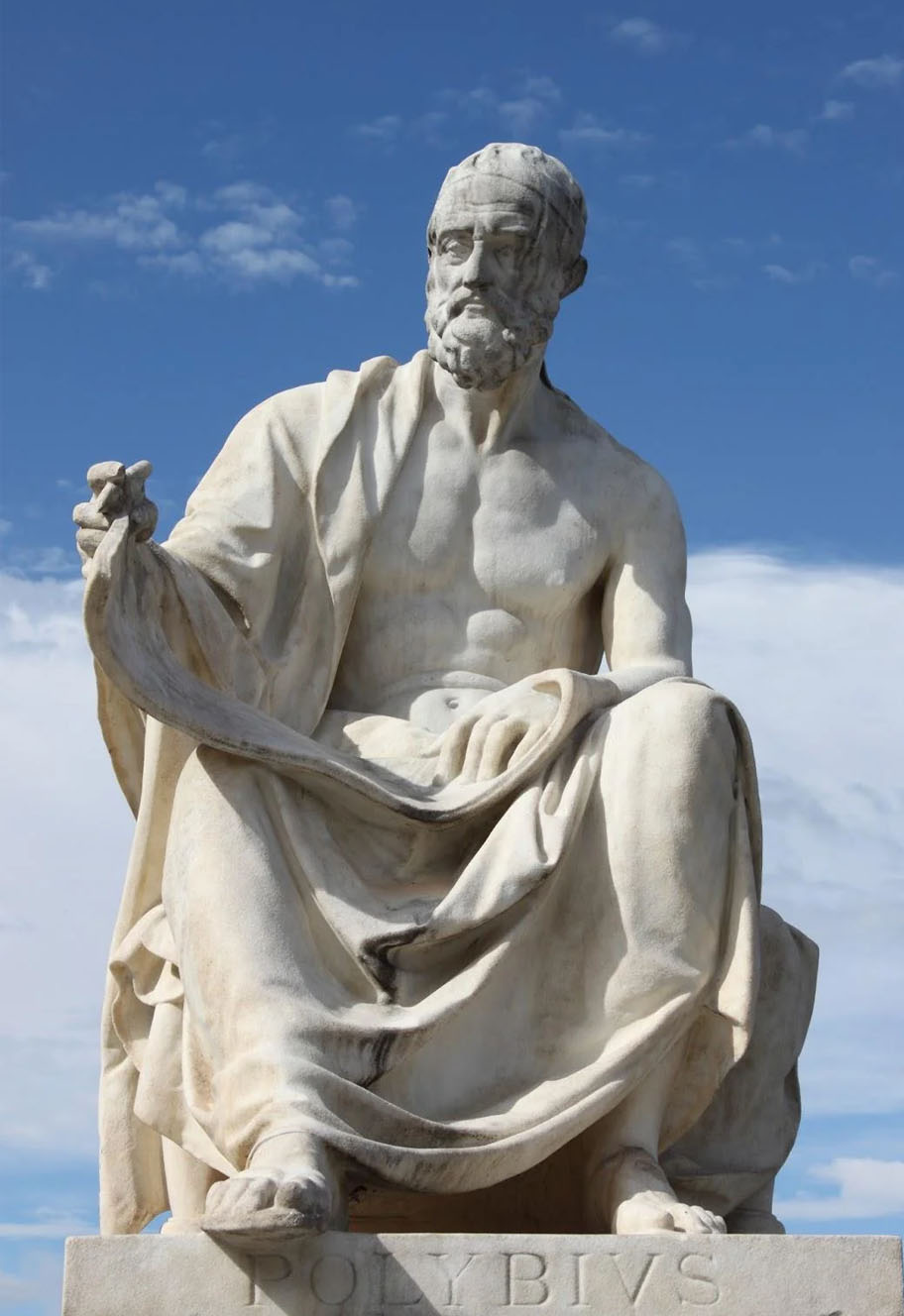Polybius
Born:
C. 200 BCE
Died:
C. 118 BC (aged approx. 82)
Polybius was an ancient Greek historian renowned for his work "The Histories," which chronicled the rise of the Roman Republic and its domination over Greece. Born in Megalopolis around 200 BCE, Polybius was a prominent member of the Achaean League and later taken to Rome as a hostage.
Early Life: Polybius was born around 200 BCE in Megalopolis, a prominent city in the Peloponnesian region of Greece. As the son of Lycortas, a prominent politician and general of the Achaean League, Polybius was deeply involved in Greek politics from a young age. His early career included military service and diplomatic missions, experiences that would later inform his historical writings.
Historical Methodology: Polybius's most significant work, "The Histories," covers the period of 264–146 BCE and focuses on the rise of Rome. Unlike many of his predecessors, Polybius emphasized the importance of factual accuracy and direct observation. He employed a systematic approach to history, combining eyewitness accounts, critical evaluation of sources, and a thorough analysis of political and military events.
Roman Experience: Polybius's life took a dramatic turn when he was taken as a hostage to Rome in 167 BCE. This period of captivity allowed him to cultivate relationships with key Roman figures, such as Scipio Aemilianus. These connections provided Polybius with a unique perspective on Roman politics and military strategies, which he meticulously documented in his writings.
The Rise of Rome: "The Histories" offers an in-depth account of Rome's expansion and its impact on the Mediterranean world. Polybius sought to explain the reasons behind Rome's success, attributing it to the virtues of the Roman constitution, military discipline, and strategic prowess. He detailed significant events such as the Punic Wars, highlighting the strategies and tactics that led to Roman victories.
Analysis and Interpretation: Polybius's work stands out for its analytical rigor and emphasis on cause-and-effect relationships in history. He was particularly interested in the cycles of political evolution and the interplay of fortune and human agency. His theories on the separation of powers and checks and balances within the Roman government influenced later political thinkers.
Criticism and Legacy: While Polybius was highly respected for his methodological contributions to historiography, his work also faced criticism for its perceived Roman bias and his sometimes harsh judgments of Greek leaders. Nevertheless, his influence on the study of history and political theory is substantial. His insights into the Roman Republic's political structure have been particularly influential in shaping modern understanding of governance.
Death and Epitaph: Polybius likely died around 118 BCE, though the exact details of his death are unclear. His legacy as a historian endures, with "The Histories" remaining a critical source for understanding the ancient Mediterranean world. Polybius is remembered for his dedication to factual accuracy and his efforts to provide a comprehensive and analytical record of history.

Quick Facts
- Polybius's "The Histories" is a crucial source for understanding the rise of the Roman Republic and its domination over Greece and the Mediterranean.
- He prioritized factual accuracy and eyewitness accounts, setting a high standard for historical methodology.
- Polybius's firsthand experiences with Roman political and military leaders provided unique insights that enriched his historical narratives.
- His analysis of the Roman constitution and military strategies offered valuable lessons in governance and statecraft.
- Polybius's emphasis on cause-and-effect relationships and the cyclical nature of political systems influenced later historians and political theorists.
Further Reading
Art &
Architecture
Ancient Greek art and architecture, with its harmonious proportions and timeless elegance, continue to inspire awe and admiration millennia later.
Discover
Greek Mythology & Mythical Characters
Greek mythology, a rich tapestry of gods, heroes, and mythical creatures, captivates the imagination with its tales of love, betrayal, and epic adventures that delve into the depths of the human psyche.
Discover
Ancient Greek History
Ancient Greek history, marked by remarkable achievements in democracy, philosophy, and warfare, shaped the foundation of Western civilization, leaving an indelible legacy of innovation and cultural influence that continues to resonate to this day.
Discover
Ancient Greek Olympics
The ancient Greek Olympics, held in Olympia every four years, celebrated athleticism, unity, and cultural pride, serving as a testament to the enduring spirit of competition and excellence that transcends time and borders.
Discover
Ancient Greek Wars
Ancient Greek wars, such as the Persian Wars and the Peloponnesian War, were pivotal conflicts that shaped the course of history, highlighting the struggle for power, independence, and the clash of civilizations in the ancient Mediterranean world.
Discover
Ancient Greek Culture and Society
Ancient Greek culture and society, characterized by its emphasis on art, philosophy, and civic engagement, fostered a vibrant intellectual and social landscape where innovation flourished, democracy thrived, and the pursuit of knowledge and excellence was celebrated as fundamental values of civilized life.
Discover